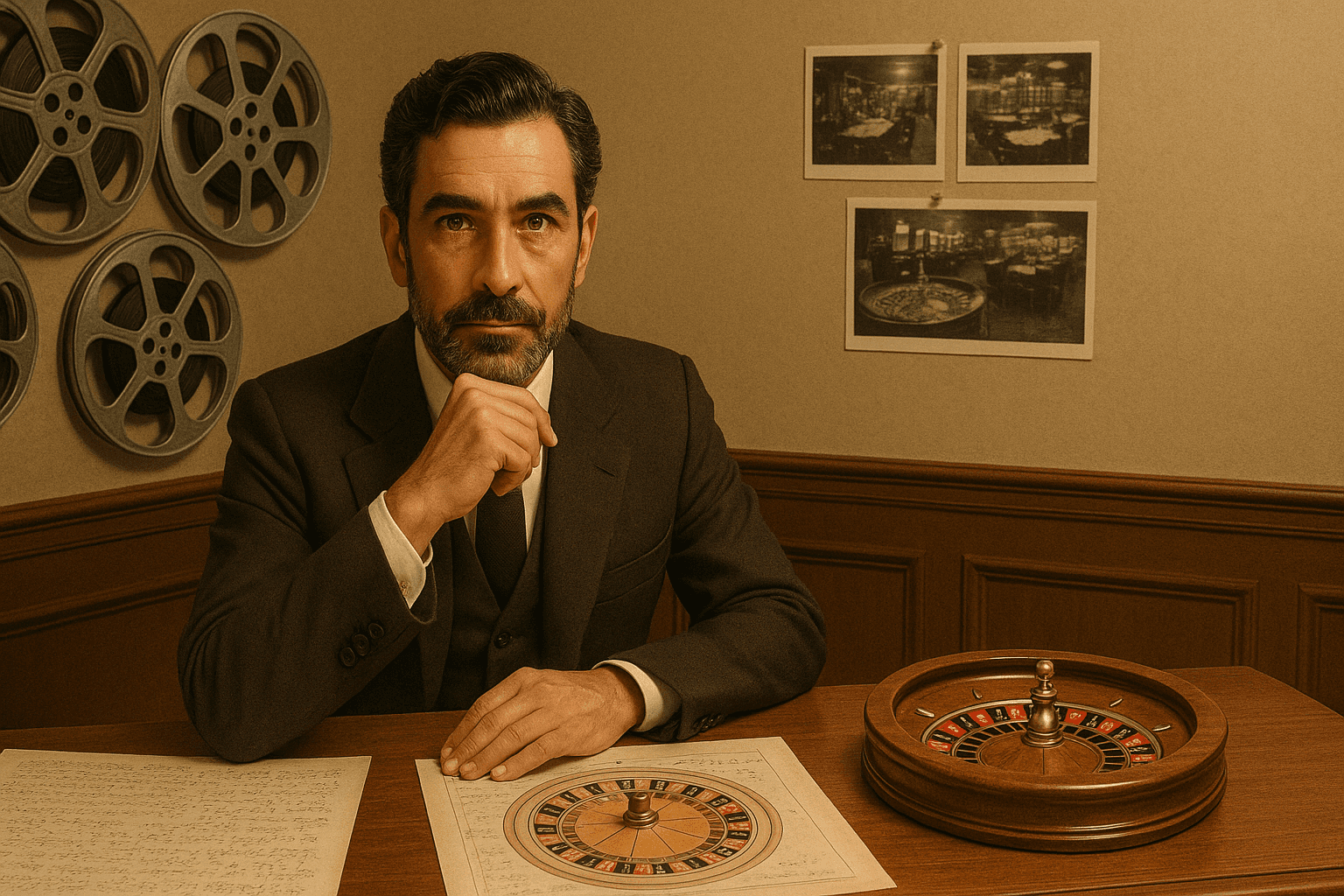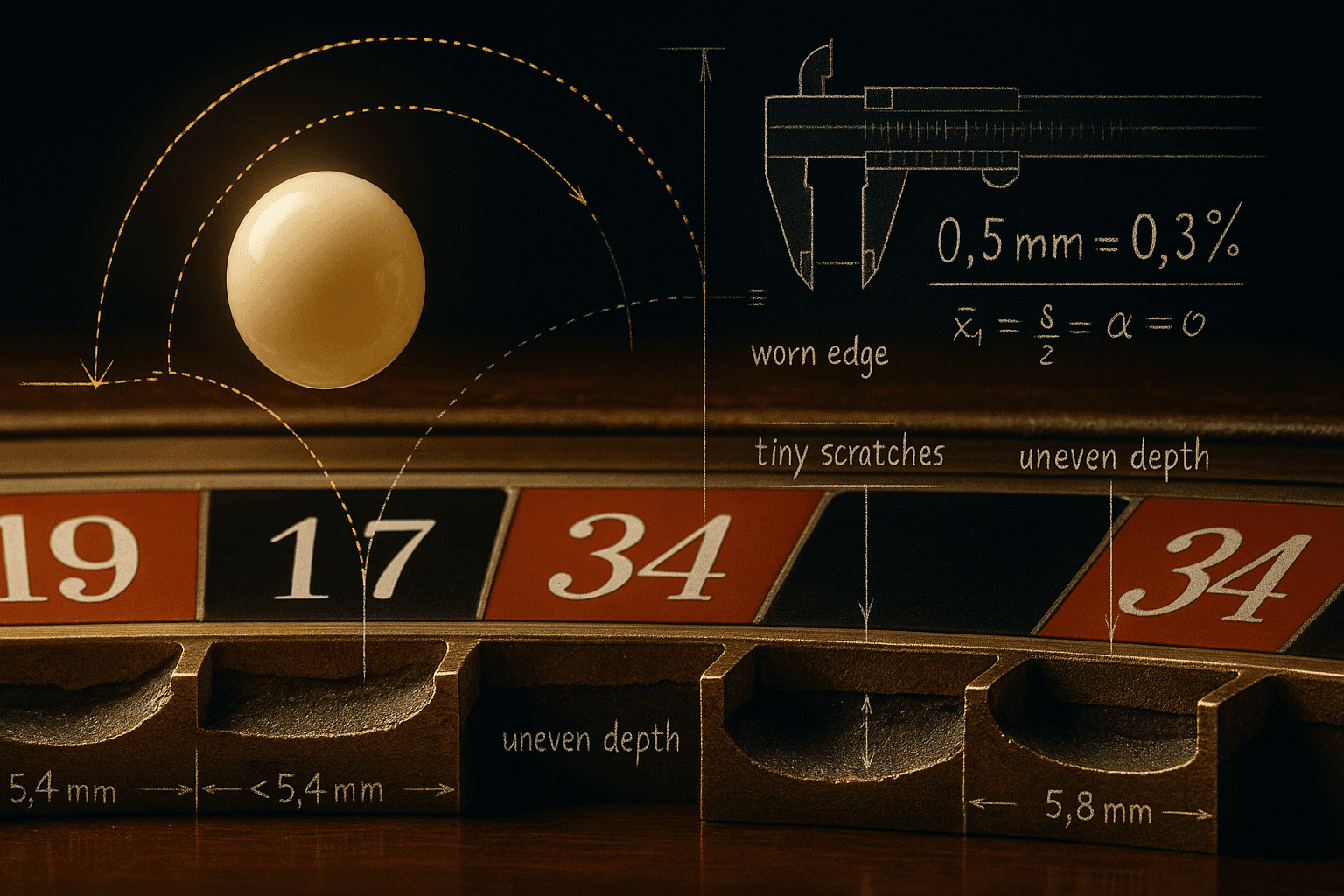How Gonzalo Garcia-Pelayo Beat Roulette – And Made Millions
"For decades, roulette stood as the casino's perfect fortress—37 numbers, infinite possibilities, absolute randomness. But perfection, as Garcia-Pelayo would prove, is often just an illusion waiting for the right mind to shatter it."
Roulette is considered one of the fairest games: a spinning wheel, a small ball, and a green table glowing with numbers and possibilities. Theoretically, it's a completely fair game: each spin is entirely independent of the previous one, there's no RTP mechanism that can be changed, every number should have the same probability, and in a regulated casino, neither the player nor the casino has any way to influence the outcome.
For decades, casinos around the world relied on this principle. Roulette was the "perfect game" – impossible to cheat, neither through strategy nor through exceptional long-term luck.
However, in the 1990s, a Spanish Renaissance man named Gonzalo García-Pelayo proved that it was indeed possible. He discovered small cracks in a system considered impenetrable – and turned them into a fortune that would make him a legend.

The mastermind behind one of gambling's greatest victories: A Spanish Renaissance man who transformed roulette from a game of chance into a science of mathematical precision.

The Renaissance Man: Who Was Gonzalo Garcia-Pelayo?
Gonzalo Garcia-Pelayo
Segovia was born on May 25, 1947, in Madrid, where his military father from
Jerez was stationed. When he was five years old, his father died, and the
family returned to Jerez de la Frontera. At age eight, he moved to Sevilla when
his mother remarried.
The Cultural Revolutionary
Long before he became famous for beating casinos, Garcia-Pelayo was already a cultural force in Spain:
Music Pioneer (1970s-80s): In 1975, he founded the record label Gong, a subsidiary of Movieplay, and over his career produced 130 albums. He worked with legendary artists including Quilapayún, Víctor Jara, Pablo Milanés, and Carlos Puebla. Most notably, he produced the early albums of Spanish rock icons like Triana, Luis Pastor, Hilario Camacho, Amancio Prada, and Carlos Cano.
Father of "Rock Andaluz": Garcia-Pelayo is credited as one of the fathers of Andalusian rock – he even coined the term. His work fused flamenco and Andalusian folk music with rock and pop, with the band Triana becoming the movement's greatest exponent.
Early Entrepreneurship: His first business venture was in 1967 when he opened "Dom Gonzalo," a revolutionary discotheque in Sevilla. The club programmed different music from competitors, premiering albums by Pink Floyd and Jimi Hendrix. The police closed it several times due to its groundbreaking programming.
Radio and Television Career: He worked as a radio host in the 1970s for Radio España and Radio Nacional de España with the program "Para vosotros jóvenes" (For You Young People). He founded Popular FM, where he created programs exploring the connections between flamenco and blues. Later, he worked on Antena 3 Radio and Onda Cero.
Film Director: Garcia-Pelayo studied Philosophy and Letters at the University of Sevilla, traveled to Paris, and later entered Madrid Film School (though he didn't complete it). He directed 17+ films, starting with "Manuela" (1976) and continuing through decades, with his latest works including "Dejen de prohibir que no alcanzo a desobedecer todo" (2021) and "Ainur" (2021).
This rich creative background would prove crucial – the same analytical mind that could understand music, film, and culture could also decode the hidden patterns in roulette wheels.
The Renaissance Man: Who Was Gonzalo Garcia-Pelayo?
"In an ideal world, every pocket should give the ball an equal chance. But Garcia-Pelayo understood a fundamental truth: wheels are physical objects, and physics always wins over mathematics in the real world."
In the early 1990s, when Garcia-Pelayo began taking interest in roulette, he approached it not as a game of chance but as a physical system – a perspective shaped by his diverse background in mathematics, creativity, and systematic thinking.
The Breakthrough: Not Every Wheel Is Born Equal
In an ideal world,
every pocket on the roulette wheel should give the ball an equal chance. But
Garcia-Pelayo understood that wheels are physical objects: • Some wear out over
time • There are microscopic bumps in the wood or metal
• The slope angle might not be completely uniform • Floor irregularities can
create subtle tilts • Manufacturing imperfections affect balance
The result: some
numbers become more likely than others – and this could be measured and
exploited.
The Scientific Method Applied to Gambling
Garcia-Pelayo developed what was essentially the world's first computerized roulette analysis system. Using a simple home computer and basic programming, he created software to detect patterns invisible to the human eye.
The Data Collection Phase Garcia-Pelayo recognized he needed massive amounts of data. He recruited family members to become his data collection army:
The Family Operation
- His five children: Iván, Vanessa, and three others became the core team
- Extended family: Nephews, cousins, and eventually even his ex-wife joined
- Specialized roles:
- Data collectors sat for hours recording spins without betting
- Analysts processed data at home using Garcia-Pelayo's computer program
- Players executed the betting strategy on biased wheels
- Scouts identified new profitable wheels
Each family member spent countless hours in Casino Gran Madrid, meticulously recording:
- Every number that came up
- Which dealer was spinning
- Time of day
- Environmental conditions
Any variations in wheel behavior
The Golden Years: From Theory to Fortune
"A 6% edge in a game where the casino typically holds 2.7% wasn't just an advantage—it was a complete reversal of fortune. Garcia-Pelayo hadn't just leveled the playing field; he had tilted it decisively in his favor."
After months of data
collection, Garcia-Pelayo's computer analysis revealed clear statistical
deviations in specific wheels. Some numbers appeared significantly more
frequently than mathematical probability would predict.
The Mathematical Edge
Through careful analysis, Garcia-Pelayo calculated that his system gave them approximately a 6% edge over the house. In a game where the casino typically holds a 2.7% advantage, this was revolutionary – they had more than doubled the normal advantage and flipped it in their favor.
The Family Business Model
The Pelayos operated with precision:
- Teams worked at Casino Gran Madrid starting in late 1991
- Never played together at the same table to avoid suspicion
- Six days a week, a methodical schedule
- Detailed logs of every session and wheel performance
- Constant refinement of their computer analysis
The Historic Summer of 1992: In what became the stuff of legend, the family's systematic approach paid off spectacularly. During the summer of 1992, they won 70 million pesetas at Casino Gran Madrid – equivalent to approximately 420,000 euros at the time.
Going Global
When Casino Gran Madrid eventually banned them, the family took their show on the road:
International Campaign (1991-1995):
- Las Vegas (MGM Grand and other casinos)
- Australia
- Austria (Vienna)
- Denmark (Copenhagen)
- Netherlands (Amsterdam)
Total Success: According to Spanish sources, the Garcia-Pelayo family won over 250 million pesetas in total – approximately 1.5 million euros, an enormous fortune for the era and representing one of the greatest systematic gambling wins in history.
The Cat-and-Mouse Game with Casinos
As the family's success grew, so did casino countermeasures.
Escalating Casino Tactics
Initially, casino management dismissed their success as extraordinary luck. But pattern recognition eventually revealed the truth:
Casino Countermeasures:
- Photographed family members for identification
- Instructed dealers to spin balls faster
- Secretly moved wheels between tables (the family learned to identify individual wheels by their unique characteristics)
- Removed players mid-game
- Banned them from premises
- Covered wheels with black cloths when suspicious patterns emerged
The Pelayos' Counter-Strategy:
- Used disguises and false identities
- Operated in multiple cities simultaneously
- Developed elaborate communication systems
- Created detailed intelligence files on casino operations and personnel
The Spreading Legend
Their reputation spread through the global casino industry. Casino managers would literally call ahead to warn other establishments when the family was traveling.
The Dutch Revelation: When they arrived at a Rotterdam casino, a family member who understood Dutch overheard staff saying, "They're here already." The realization that their anonymity was completely blown marked the beginning of the end of their roulette career.
The Legal Battle That Changed Gambling Law
The success of the Garcia-Pelayo family eventually led to unprecedented legal action.
The Lawsuit (1994)
Casino Gran Madrid took the extraordinary step of suing Gonzalo Garcia-Pelayo, demanding return of their money and claiming fraud. The case became a landmark in gambling law that would take a decade to resolve.
The Central Legal Question: Where is the line between skill and cheating? The casino argued that using computer analysis constituted cheating, while Garcia-Pelayo's defense maintained that exploiting mechanical defects was legitimate advantage play.
The Historic Victory (2004)
After ten years of litigation, Spain's Supreme Court issued its final verdict: Garcia-Pelayo was completely vindicated. The court found no evidence of cheating, device manipulation, or rule violations.
The Broader Legal Impact: The ruling established crucial precedents:
- Casinos are responsible for maintaining fair equipment
- Mathematical analysis of publicly available information is legal
- Advantage play based on skill and observation is permissible
- The burden of equipment integrity lies with casino operators
The court's decision became precedent-setting for gambling law across Europe and validated Garcia-Pelayo's position that intelligence and systematic analysis are not the same as cheating.
Cultural Impact and Media Legacy
Garcia-Pelayo's story transcended gambling to become a cultural phenomenon representing the triumph of intellect over institutional advantage.
Literary and Media Impact
"The Fabulous Story of the Pelayos" (2003): Gonzalo and his son Iván co-authored this bestselling book, revealing their methods and adventures for the first time. The book became essential reading for anyone interested in advantage play or mathematical approaches to gambling.
"Breaking Vegas" Documentary (2005): The History Channel's acclaimed series featured a full episode on the Pelayos, titled "Roulette Assault," introducing their story to millions of viewers worldwide and cementing their place in gambling folklore.
"The Pelayos" Film (2012): Spanish director Eduard Cortés created a feature film dramatizing their casino adventures, bringing the story to cinema screens internationally.
Symbol of David vs. Goliath
The Pelayos became cultural symbols of the "little guy" beating the system through:
- Intelligence over luck
- Family unity and trust
- Systematic thinking over superstition
- Persistence in the face of institutional opposition
Legal vindication of mathematical skill
Life After Roulette: The Continuing Evolution
Return to Entertainment Roots
After concluding their roulette career, Garcia-Pelayo returned to his original passions:
Film Renaissance: After a 30-year hiatus, he returned to filmmaking with renewed vigor, directing "Alegrías de Cádiz" (2012), which premiered at the Vienna Film Festival "Viennale 2013." The festival also screened a retrospective of his five earlier films.
International Recognition: In 2014, the prestigious Galerie Nationale Jeu de Paume in Paris dedicated three weeks to "VIV(R)E LA VIE! Symphonie underground. Le cinéma de Gonzalo García Pelayo," screening his six films with special weekends dedicated to flamenco and the work of his mentor, Paulino Viota.
Prolific Late Career: He continued directing well into his 70s, with recent works including "Nueve Sevillas" (2020), "Dejen de prohibir que no alcanzo a desobedecer todo" (2021), "Ainur" (2021), and "Alma quebrada" (2022).
Gambling Education and Innovation
Poker Excellence: Garcia-Pelayo established Spain's first poker school, "Los Pelayos Poker," where his son Oscar and nephew became instructors. They applied their statistical analysis skills to poker, achieving considerable success.
Sports Betting Systems: The family developed innovative approaches to sports betting and "quiniela" (football pools), continuing their tradition of finding mathematical edges in games of chance.
Mentoring Champions: Garcia-Pelayo managed Juan Carlos Mortensen, who became the only player to win both the World Series of Poker (WSOP) and World Poker Tour (WPT) championships – a testament to Garcia-Pelayo's ability to identify and develop winning systems beyond roulette.
The Revolutionary Impact on the Casino Industry
Garcia-Pelayo's success forced a fundamental transformation in how casinos operate roulette games worldwide.
Industry-Wide Changes
Enhanced Wheel Maintenance:
- Regular computerized analysis of all wheel results
- Frequent wheel rotation between tables
- More frequent equipment replacement cycles
- Advanced manufacturing standards to minimize imperfections
Surveillance Revolution:
- Sophisticated player tracking and identification systems
- Pattern recognition software to identify advantage players
- International database sharing between casino operators
- Enhanced staff training on advantage play detection methods
Technological Evolution: Modern roulette wheels are engineered with precision manufacturing techniques designed to eliminate the type of bias Garcia-Pelayo exploited. Casinos now employ their own mathematical analysis – ironically using similar principles to what Garcia-Pelayo pioneered – to detect any emerging biases before they can be exploited.
Philosophical Lessons from a Master
Garcia-Pelayo's story offers insights that extend far beyond gambling:
1. Question "Impossible" Systems
What appears random or
unbeatable often contains hidden patterns. The key is developing the tools,
patience, and systematic approach to find them.
2. Small Advantages
Compound Exponentially
A seemingly
insignificant 6% edge, when systematically exploited over time, can generate
extraordinary results. This principle applies to investing, business, and many
life endeavors.
3. Institutions Adapt to Threats
Once Garcia-Pelayo's
methods became known, the entire casino industry implemented countermeasures.
Success often carries the seeds of its own obsolescence, requiring constant
innovation.
4. The Power of Family and Trust
The Pelayos' success
required unprecedented coordination and trust among family members. Their bonds
were as crucial as their mathematical models – highlighting that even the most
technical endeavors often depend on human relationships.
5. Legal Victory Through Preparation
Garcia-Pelayo's decade-long legal victory wasn't just about being right – it was about having the documentation, evidence, and systematic approach to prove it in court.
The Modern Context: Why It Can't Be Repeated
Could another Garcia-Pelayo emerge today? The answer is almost certainly no.
Why the Window Has Closed:
- Precision Engineering: Modern wheels are manufactured to tolerances that eliminate detectable bias
- Real-Time Monitoring: Computer systems analyze every spin instantly
- Rapid Response: Any suspicious patterns trigger immediate investigation and equipment changes
- Global Information Sharing: Casino networks share player information internationally
- Legal Awareness: Staff are extensively trained to recognize and counter advantage play
The Historical Moment: Garcia-Pelayo's success occurred during a unique window when casino technology lagged behind analytical capabilities. The gambling industry has since invested billions to ensure that window remains permanently closed.

Conclusion: The Man Who Outsmarted the System
"True intelligence is transferable across domains. The same analytical mind that could revolutionize Spanish rock and decode musical trends could also crack the mathematical secrets hidden in roulette wheels."
🏆 Gonzalo Garcia-Pelayo's story represents something rare in gambling history – a complete, documented victory over supposedly unbeatable odds achieved through pure intellect and systematic analysis.
💡 The Deeper Significance: Beyond the fortune won and the casinos defeated, Garcia-Pelayo proved that the boundary between skill and luck is more complex than institutions would have us believe. He didn't cheat the system – he understood it more thoroughly than its creators.
🎨 The Renaissance Legacy: Garcia-Pelayo's diverse career – from revolutionizing Spanish rock to beating global casinos to creating acclaimed films – demonstrates that true intelligence is transferable across domains. The same analytical mind that could decode musical trends could also decode roulette patterns.
👨👩👧👦 The Family Achievement: Perhaps most remarkably, the Pelayos proved that extraordinary success can be a family affair built on trust, coordination, and shared purpose. Their victory was as much about human cooperation as it was about mathematical analysis.
⚡ The Lasting Symbol: In an age of increasing systematization and surveillance, Garcia-Pelayo stands as a testament to human ingenuity – proof that even the most carefully designed systems contain hidden vulnerabilities, waiting for someone with the right combination of intelligence, patience, and courage to discover them.
🕰️ Today, when such opportunities have been systematically eliminated, the story of Gonzalo Garcia-Pelayo and his family remains a powerful reminder: somewhere in every seemingly perfect system lies a small flaw, waiting for a Renaissance mind to find it and turn it into legend.
👁️ The question isn't whether such opportunities still exist – it's whether we have the vision to recognize them when they appear.